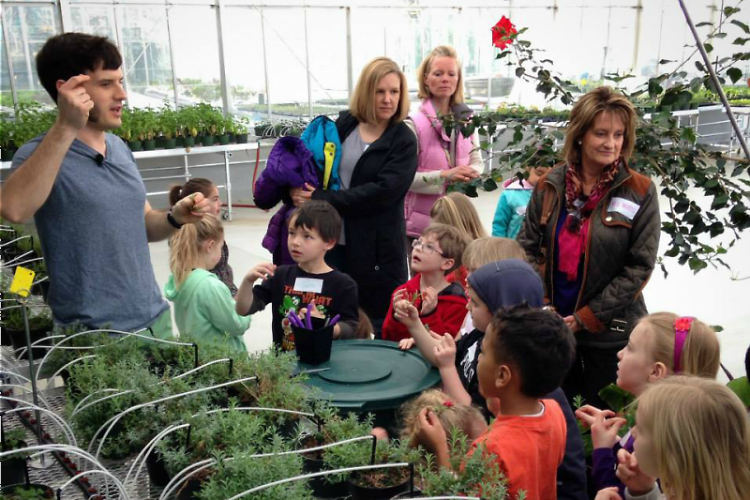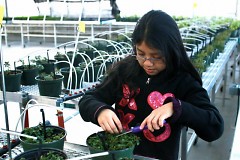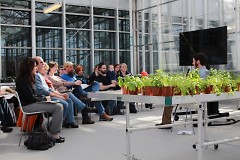While many community members and visitors have come to know the Downtown Market as a great place to grab lunch, dinner or local goodies from one of the 20+ vendors serving handmade meals, snacks and desserts as well as locally raised meats, fresh fish and organic produce, many don’t know what goes on at the Market other than the vendors in the Market Hall. What goes on in the greenhouse, and in the kitchens? And how does the Market interact with the community?
Supporting the Heartside Community: Creating Place
Located in the Heartside Community, the Downtown Market has a deep commitment to the neighborhood and its residents. From food assistance to scholarships to free events, the Market aims to be a place where everyone feels welcome.
For residents using food assistance, eligible vendors inside and outside the Downtown Market accept Bridge Cards, EBT, Fresh/Senior Project Fresh and Project Fresh/WIC. Outdoor Farmers Market vendors honor the Double Up Food Bucks program during the summer months; tokens can be found at the Outdoor Market table under the outdoor shed, on Saturdays from 9 a.m.- 2 p.m. Those with Bridge Cards can visit the main office on the second floor to get their tokens, and those tokens may be spent at any eligible shop inside or outside.
Downtown Market staff partner with area agencies, Mel Trotter and Dégagé, to support and market a variety of free events, such as the Easter Egg Hunt, Dia De Los Muertos and the Holiday Open House, to area residents. A workforce development partnership with Goodwill places local residents into part time positions at the Market. In 2014, the Downtown Market won Goodwill’s “New Partner of the Year” award, highlighting residents who have found meaningful work at the Market. Greenhouse and facilities staff work with Kent County Court Service to provide a safe environment for those who are required to complete court-ordered community service.
Free classes
This summer, the Market is hosting free weekly community yoga classes in Heartside Park through September 10, in partnership with DGRI/Parks & Rec.
The Healthy Eating for All scholarship program, in partnership with Spectrum Health, provides scholarships for organizations to bring in groups for healthy living and cooking classes at the market, at no cost to participants. To date, this program has served more than 1,300 individuals and 34 community groups, including Cherry Street Health Clinic, The Other Way Ministries, Senior Neighbors, South End Community Outreach Ministries, Kent Health Plan, Access of West Michigan, Heartside Neighborhood Collaboration Project, Heart of West Michigan United Way, Bethany Christian Services, Fit Kids 360, First Steps Kent County, GR Urban League, Heartside Ministry, Dwelling Place, Boys & Girls Club of GR and Baxter Community Center.
Along with those scholarships, recipients can receive Produce Bucks to purchase healthy foods at Relish Green Grocer, and Rapid passes to aid in transportation to and from the Market. More than $25,000 in produce bucks has been distributed to date.
West Michigan Agriculture and Food Entrepreneurs
A large part of the Downtown Market’s mission is to support West Michigan farms and local food producers. Relish Green Grocer, the fresh produce market inside the Market Hall, buys from more than 20 local farms and supports more than 30 local food producers, many of which are making their products in the Downtown Market’s Incubator Kitchen.
Many of the other businesses in the Market Hall support local farmers as well, such as Tacos El Cuñado, which lists where its produce and meat are sourced on a sign at the counter. Others, including Aperitivo, Love's Ice Cream, Field & Fire and Montello Meat Market take pride in using local and sustainable produce, meat, grains and dairy products as well.
The incubator kitchen, a space for food entrepreneurs to develop and grow sustainable food businesses, has aided in the development of more than 200 businesses since opening. Forty-four of those businesses have utilized the incubator kitchen for full-scale production (18 of which are brand new startups), and more than 78 new jobs have been created in the community as a result. The kitchen has become an anchor for new food businesses, an educational space for KISD’s culinary students and a playground for those seeking culinary and entrepreneurial training. Its three-tier rate system is intended to encourage experimentation and business creation for those who don’t have the startup capital to purchase or rent their own kitchen.
Keeping it hyperlocal in the Greenhouse
The greenhouse is not only a beautiful event space, but also a truly functional hyperlocal growing space. Two greenhouse managers, Ben Bylsma and Josh Usadel, work with businesses in the Market Hall as well as the education department to grow produce used inside the building every day.
Kids, adults and families who take classes in the teaching kitchen are often using herbs and vegetables from the greenhouses in the recipes they are learning to create during classes. Simmer Camp, a day camp for kids and teens that takes place every summer, holds half a day in the greenhouse where kids learn about plants and how they grow. They then harvest produce to use in the recipes they create in the teaching kitchen that afternoon.
Downtown Market tenants count on the greenhouse to grow organic herbs, vegetables and fruit for the food they make and sell in the Market. For instance, Malamiah Juice Bar uses about 30 flats of wheatgrass grown in the greenhouse every month for their wheatgrass shots.
In the spring, local farmers and hobby gardeners can rent bench space in the greenhouse to start their plants in a temperature-controlled environment, which is important to many small farmers because of Michigan’s short growing season. In 2015, 25 local farms, nonprofits, and tenants/staff members used the greenhouse to start plants for their gardens and farms, including Blandford Nature Center, Well House, New City Urban Farm and Urban Roots. In addition to providing the space, the Downtown Market also offers gardening tools and daily watering.
The greenhouse also incubates small plant businesses, much like the incubator kitchen incubates startup food businesses. Global Gardens, a local business that creates moss-covered plant globes, started as an experiment in the greenhouse and now sells their hanging herb, flower and plant gardens in local retailers such as Relish Green Grocer.
Other local groups volunteer in the greenhouse for group bonding, community service or just for fun. More than 10 groups have volunteered in the greenhouse this year, including East Grand Rapids High School special education, KISD hospitality students, Disher Design, Well House, Catherine's Health Center, DA Blodgett/St. Johns, Urban Roots, Revive and Thrive, One Love Oasis, Reformation Growers, Black Bird Farms and Madison Square Food Pantry.
In the Kitchens
The teaching kitchen hosts culinary classes for kids, teens and adults nearly every day of the week, often partnering with business owners from the Market Hall, such as Spice Merchants, Malamiah Juice Bar and Montello Meat Markets, to teach these classes and to share their passion for local and healthy foods. But who else uses the facility?
This spring, a group of MSU College of Human Medicine students used the Teaching Kitchen for a Culinary Medicine pilot course, to learn about links between preventable disease and diet.
College students aren’t known for having the healthiest diets, and many survive on convenience foods and caffeine. But what about medical students, who are training to go into the business of health? Scientists are constantly discovering new links between preventable diseases and what we eat, but many doctors still lack the knowledge and skills to choose and prepare their own healthy meals, let alone help their patients.
Pioneered by Tulane University, the Culinary Medicine curriculum follows recipes and discussion guides to teach students how to cook healthy meals that fit into their busy and often irregular schedules, and how to talk to their patients about nutrition and healthy diet choices.
The class was taught in partnership with Kent County Health Department, with a sponsorship from Michigan State University Extension. The teaching kitchen was the perfect learning environment, with HD monitors at each cooking station for an up-close view of the instructor's chopping, dicing, filleting and sautéing. Students sourced many of their fresh ingredients from the Market Hall’s 20+ small food businesses.
The Rapidian, a program of the 501(c)3 nonprofit Community Media Center, relies on the community’s support to help cover the cost of training reporters and publishing content.
We need your help.
If each of our readers and content creators who values this community platform help support its creation and maintenance, The Rapidian can continue to educate and facilitate a conversation around issues for years to come.
Please support The Rapidian and make a contribution today.



